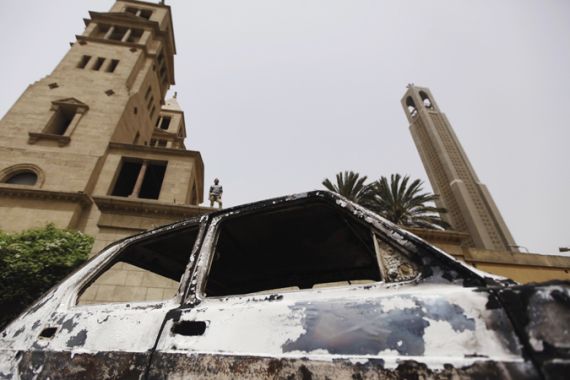Egypt’s Christians face unprecedented attacks
More than 30 churches have been destroyed in the past week as thugs launch a campaign of intimidation.

Cairo, Egypt – At Abu Seifein church in the wealthy Cairo district of Mohandeseen, there was little sign of any damage on Thursday, despite the rubble lying in the streets nearby. The church is a short walk away from Al-Gamat Al-Dowal Street, the site of heavy clashes the day before, but despite the violence, the church escaped unscathed.
Many churches in Egypt were not so lucky. Security forces moved to violently disperse two protest camps by supporters of ousted president Mohamed Morsi in Cairo on Wednesday morning, setting in motion a day of deadly violence that left at least 525 people dead in clashes across the country.
Amid the violence, alleged Morsi supporters carried out on dozens of attacks on churches and Christian-owned properties throughout the country.
Mina Thabet, an activist with Christian rights group the Maspero Youth Union, told Al Jazeera on Friday that at least 32 churches had been “completely destroyed, burned or looted” in eight different governorates over the previous two days. The group also recorded dozens of other attacks on Christian-owned shops, businesses and schools around the country.
The Anglican church of St Saviour’s in the city of Suez was one of those attacked on Wednesday. “They attacked the church with Molotov cocktails and stones, and the car of the priest was completely destroyed,” said Egypt’s Anglican Bishop, Mouneer Annis. “Two other churches in Suez were completely burned – and the thugs looted the churches afterwards. It’s a mixture between burning and looting.”
“It never happened before in history that such a big number of churches were attacked on one day,” Bishop Thomas, a Coptic Orthodox bishop in Assiut told Al Jazeera. “We normally used to have attacks once a month or so.”
Political dimensions
Christians, who make up around 10 percent of Egypt’s population, have long complained of discrimination and periodic violent attacks by extremists. However, since the ouster of Mohamed Morsi on July 3, the number of recorded sectarian incidents has dramatically increased.
Christians were widely seen as being supportive of the transition, and Coptic Orthodox Pope Tawadros II, the leader of Egypt’s largest Christian denomination, publically supported the move.
Michael Magdy, 24, a Christian who works at a pharmacy in Mohandiseen close to Abu Seifein church, was not initially supportive of the military-backed transition.
“I protested on June 30 against Morsi, but at first I wasn’t convinced about the army taking control of Egypt. I don’t like the police or the army. I was at the Mostafa Mahmoud [protests in 2011] and at the Port Said massacre in 2012,” he said, referring to a notorious incident of football violence in which the police were accused of complicity.
“But the Muslim Brotherhood were putting women and kids on the front lines of their protests, so I think the army had to disperse them,” he said.
Hany Bushra, 41, a Christian engineer who lives in Mohandiseen, agreed that the dispersal of the sit-ins was necessary. “The army had to do what they did. They waited a long time, and nothing happened. These people are terrorists. They want to drive Christians out of the country.”
Youssef Sidhom, editor of Christian weekly Watani, believes that the recent surge in violence is an attempt to divide Egyptians into sectarian camps. “The Muslim Brotherhood are trying to split the nation. This is a collective punishment, enforced on Christians because they supported the ouster of Morsi,” he said.
Bishop Annis agrees that Christians are being targeted by Brotherhood supporters. “We know [the attackers in Suez] were Islamists as they had beards. Last week also, Morsi supporters were demonstrating in Suez in the streets, and they stopped in front of St Saviours’ and chanted against Pope Tawadros.”
Egypt’s ‘worst sectarian crisis’
Paul Sedra, an associate professor of history at Simon Fraser University, believes that Wednesday’s violence was an extension of an ongoing demonisation campaign by the Muslim Brotherhood against Christians.
”Copts
constituency… As a result, they are often left to bear the brunt of political violence”]
“Throughout their rule and since Morsi’s deposition from power, they have engaged in explicitly sectarian appeals that have aimed to vilify Copts as their chief antagonists in Egypt,” Sedra told Al Jazeera. “When Islamists are loathe to attack the state directly, they often settle for attacking Copts, because they are an easy target.”
The Egyptian authorities have often been criticised for failing to respond swiftly to attacks on Christians. But there is little sign that Wednesday’s violence has diminished the support of Egyptian Christians for the military-led government and its transitional roadmap.
“The attacks on churches were condemned immediately by the prime minister and the interior minister yesterday, and this is a positive sign,” said Bishop Annis.
Bishop Thomas believes that security “needs to be improved” but argues that delays in responses on Wednesday were understandable as forces were “overwhelmed”.
Sedra, however, argues that state authorities also bear responsibility for the ongoing violence. “The state is competing with the Islamists to win over the loyalties of the population, and the Copts are not seen as an important constituency in this. As a result, they are often left to bear the brunt of political violence,” he told Al Jazeera.
“There’s no question that this is the worst sectarian crisis that Egypt has seen in its modern history.”